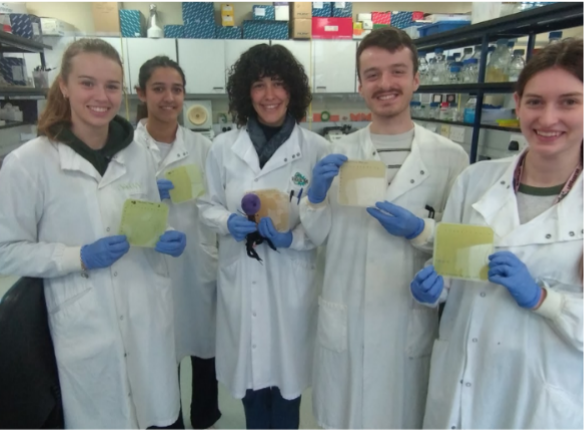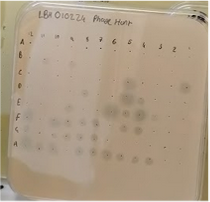In a recently published paper in the journal Microorganisms, led by Dr Julie Fletcher and Professor Ben Temperton at the University of Exeter, The Citizen Phage Library has demonstrated its potential as a platform for rapid discovery of friendly, bacteria-killing viruses (phages). Water samples provided by citizen phage hunters and wastewater from the Environment Agency enabled phage hunting for antibiotic-resistant bacteria within the UK. In the context of a rapidly developing, positive outlook for phage therapy, the study showed phage therapy can be considered in the UK should current antibiotic treatments fail.
Publication Date: 25th January 2024
Funding: Medical Research Council (UKRI), Wellcome Trust
The Citizen Phage Library project is a platform for UK-based phage therapy
In the wake of the antibiotic resistance crisis1, researchers have turned their attention toward new weapons to treat deadly bacteria. One such option is the use of bacteriophages (phages) alongside antibiotics. Phages are friendly viruses that attach to bacteria to infect them, where they force the bacteria to make new phages before breaking open the bacterial cell, killing it.
However, phages are very specific to bacteria. Before using phages in the clinic, phages need to be matched to a patient’s infection. If the phage does not kill the bacteria, then phage therapy will not work. Large libraries of many different types of phages increase the chances that a phage can be found for a specific patient.
Since the Citizen Phage Library project was launched at the University of Exeter in 2020, over 1,000 phages have been isolated against a range of antibiotic resistant bacteria from samples sent in by citizen scientists from around the country, and wastewater provided by the Environment Agency.
In the last quarter of 2022, the Citizen Phage Library team accepted a request from a clinical microbiology lab to help find phages for three antibiotic-resistant bacteria: E. coli, E. cloacae, and K. pneumoniae. Working in line with current recommendations2,3, using samples from citizen science enabled rapid identification of phages for these target bacteria within days, showing that with the correct investment, resources and regulatory framework, phage therapy can be used as a personalised therapy to combat drug-resistant infections.

What this paper shows is that finding clinically safe and effective bespoke phage cocktails to treat multidrug-resistant bacteria can be completed quickly and efficiently by combining high throughput methods with large biobanks of both phages and environmental samples. Citizen science is a powerful tool, not only to inform the public about the antimicrobial resistance crisis, but to also be directly involved in its solution.- Professor Ben Temperton, Citizen Phage Library founder
Phages from Citizen Samples Were Rapidly Shown to be Active Against Clinical Strains
The Citizen Phage Library (CPL) encourages citizen scientists from around the country to send water samples to the University of Exeter where they are processed to isolate phages against a range of deadly pathogens. Enough environmental samples have been received now that the library contains over 1,000 phages against a range of bacteria identified as priority targets by the World Health Organisation. Forty-two of these killed the E. coli, producing clear zones with no growth on a lawn of the bacteria. The incredible specificity of phages was on full show, as only one phage twenty potential candidates was found to kill the received K. pneumoniae.
However, the strength of the CPL library is that it contains both a library of phages and processed water samples where new phages can be found. Within four days, phage hunting with these stored samples produced an almost-overwhelming 169 holes of hope for K. pneumoniae and 163 for E. cloacae, from which thirty-nine were taken forward for further analysis through understanding their genetic material and bacteria-killing potential.
Our experience as part of COG-UK for genomic surveillance of COVID19 showed that a network of distributed, but connected groups running standardised protocols can respond rapidly to both local and national demand. A similar networked model using standardised and accredited approaches like those outlined in this paper could provide personalised phages within the UK healthcare system. Either that or a well-funded centralised facility to convert potentially useful phages found by citizens into accredited clinical products would be a game-changer for the UK. The recommendations of the House of Commons select committee on UK Phage Therapy supporting such an endeavour were most welcome.- Professor Ben Temperton
Citizen-discovered phages highlight the diversity in the biological world
Citizen samples are also an incredible tool for improving our understanding of phage diversity. Although phages are accepted to be the most numerous organisms in the world, outnumbering even bacteria ten-fold, we keep finding completely new phages in new places that possess new methods of killing bacteria. Of forty-one phages the team analysed, twenty-nine represented never-before-seen species, with much of this novelty coming from phages in samples sent in by citizens from diverse locations including Glastonbury music festival, local rivers, ponds, and even on student Duke of Edinburgh award trips.

Using our extensive collection of phages already held in the library we were able to identify 42 phages that were active against the E. coli strain. In the case of the K. pneumoniae and the E. cloacae strains, we started a phage hunt from scratch. With nearly 600 water samples collected by citizen scientists and our wastewater samples gifted to us by the Environment Agency we were able to start a phage screening programme against these bacteria immediately. Within four days we had obtained 169 positive hits for K. pneumoniae and 163 for E. cloacae. We focused on further characterisation of 20 K. pneumoniae phages and 21 E. coli phages. DNA sequencing of these phages revealed 29 novel species. In the case of novel species, citizens were invited to name their phages and we had some fabulous names including Bobalons, Bumbleweed, Aragogtheria and McMelon.- Dr Julie Fletcher, Lead author of the study
Phage onslaught from multiple angles
A common strategy when giving phages to patients is to combine different types of phages into ‘cocktails’. Cocktails force the bacteria to defend itself from multiple phages simultaneously, making it more difficult to become resistant. Furthermore, when combined with the effects of the immune system and antibiotics, often the bacteria struggle to survive this all-out antimicrobial attack. This is because bacteria often can’t adapt quickly enough to overcome everything, and if it does, it comes at a huge cost to its ability to survive within the patient.
As such, attention was focussed on designing a cocktail to kill K. pneumoniae stone dead. A diverse set of phages that were ideal candidates for therapy were selected and combined into a cocktail. Although powerful on their own, when combined, these phages prevented any bacterial growth over 24 hours. Testing within an animal model (in this case waxworm moth larvae), prevented the infection from taking hold. The bespoke phage cocktail designed in less than three weeks from the phages being discovered was therefore highly effective.
What does this mean for UK phage therapy?
Phages are undeniably a powerful tool for combatting the antibiotic resistance crisis. Many case studies4–6 have shown that if used correctly, they can be very effective, with limited side effects, and the potential to render previously ineffective antibiotics usable again.
It is unlikely that phages will be readily available on the NHS in the short-term. Phages are biological products that are produced using methods that sit outside standard drug manufacture, and so need to be made with the correct quality assurances to ensure safety. Over the past few months, there has been lots of discussion (most notably a House of Commons select committee on use of phage as antimicrobials) between different sectors about procedures for production of phage that are quick, minimise risk, and a producd as a standardised product.
With so much variability in phage-bacteria interactions, this poses a significant challenge that requires further research and a flexible framework that balances the risk of using novel (but safe) therapeutics to the risk to a patient with no remaining treatment options.
“The challenges of developing an agreed regulatory framework to make [phage therapy] happen remain. We hope that current and future governments will follow through on the recommendations of the select committee and provide the necessary political and financial support to leverage phage therapy to treat the silent pandemic of antimicrobial resistance. Just as with climate change, this is a problem that requires efforts of researchers, clinicians, governments, regulators, and citizens working together across international boundaries to resolve. Just as with climate change, time is not on our side, and the most cost-effective solution is to act quickly.- Professor Ben Temperton
However, Dr Fletcher and collaborators at the Citizen Phage Library showed that once the production pipeline is agreed, UK phage therapy is possible with sufficient funding. Pushing this forward, the Citizen Phage Library is a part of a growing national and global community aiming to make phage therapy accessible to everyone. By working with UK regulators and scientists and making the vast library freely available to those that need it to aid international phage therapy, those part of the Citizen Phage Team are excited by the role the project will play in the coming months and years.
References and further reading
1Murray, C. J. et al. Global burden of bacterial antimicrobial resistance in 2019: a systematic analysis. The Lancet 399, 629–655 (2022).
2Pirnay, J.-P. et al. The Magistral Phage. Viruses 10, 64 (2018)
3Khatami, A. et al. Standardised treatment and monitoring protocol to assess safety and tolerability of bacteriophage therapy for adult and paediatric patients (STAMP study): protocol for an open-label, single-arm trial. BMJ Open 12, e065401 (2022)
4Green, S. I. et al. A Retrospective, Observational Study of 12 Cases of Expanded-Access Customized Phage Therapy: Production, Characteristics, and Clinical Outcomes. Clin. Infect. Dis. ciad335 (2023) doi:10.1093/cid/ciad335
5Young, M. J. et al. Phage Therapy for Diabetic Foot Infection: A Case Series. Clin. Ther. (2023) doi:10.1016/j.clinthera.2023.06.009
6Aslam, S. et al. Early clinical experience of bacteriophage therapy in 3 lung transplant recipients. Am. J. Transplant. 19, 2631–2639 (2019)